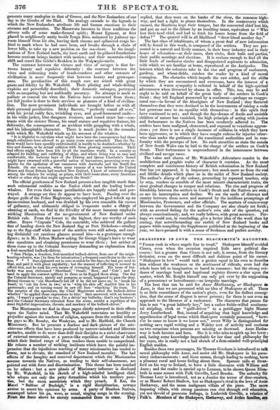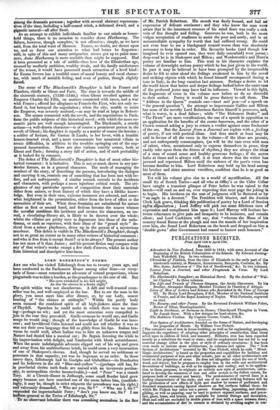SHAKSPEBB IN LOVE. THE BLACKSMITH'S DAUGHTER.
"Focus rush in where angels fear to tread." Shakspere himself avoided Cicero, even when the occasion required little save political dis- course: but a greater than Cicero is not safe, it seems, from the literary fictionist, even on the most difficult and dubious point of his career. "Shakspere in love" would task a genius equal to his own to describe him without the weakness or the sentiment of ridicule, ever' had the whole been left to imagination or based in romance : but the strong evi- dence of marriage bond and baptismal registry throws a slur upon the matter, which Mr. Knight himself can only get over by the supposition of a precoutract or betrothment—an irregular marriage.
The best that can be said for Anne Hathaway, or Shakspere is Love, is that we are presented with no idea of Shakspere at all. There is so little resemblance of the nation's glory, even for the dullest concep- tion, that the sense of disgust is never, present; for there is not even an approach to the likeness of a caricature. The character that passes for him is not "a great lubberly boy," but a rather feeble-willed sentimens tal stripling, clerk or "quill-driver" to a pettifogger highs Master Jerry Leatherhead. But, instead of acquiring that legal knowledge and apprehension of legal terms which Shakspere certainly possessed, " how= e'er he came to know it we know not," sweet Willy is distinguished fot nothing save rapid writing and a Wakley sort of activity and coolness on two occasions when persons are missing or drowned. Anne Hatha- way is both heroine and hero. She it is who tries to spirit up her lover : and, bating some knowledge improbable for her time and philosophy for her years, she is really not a bad sketch of a firm-minded well-principled English maiden.
Besides these two personages, Sir Thomas Gresham is introduced to talk moral philosophy with Anne, and assist old Mr. Shakspere in his pecu- niary embarrassments : and these scenes, though leading to nothing, have a pleasant rural and home feeling about them. Spenser calls at Strat- ford on his way to Ireland, to have a little discourse with William and Anne ; and the reader is carried up to Lunnun, to be shown Queen Eliza- beth in some scenes with Fulk Greville,, Lord Brooke. The unlucky Sit. Thomas Lucy is introduced, not as a Justice the terror of deer-stealers, or as Master Robert Shallow, but as Shakspere's rival in the love of Anne Hathaway, and the mean :nalignant villain of the piece. The more imposing villain, with strong passions run riot through evil education, yet not devoid of generous feelings, is Ludovick Greville, a relation of Fulles. Members of the Shakspere, Hathaway, and Arden families, are
among the dramatis persona; together with several abstract representa- tives of the time, including a half-crazed witch, a deformed dwa4 and a gigantic natural—all after Scott.
As an attempt to exhibit individuals familiar to our minds as house- hold things, there is no occasion to consider Anne Hathaway. The failure, however, though complete, is not offensive; simply, as we have said, from the total want of likeness. Names, no doubt, are thrust upon us, and so force our attention to what had better be forgotten : still, in spite of this and many antiquarian scenes got up to paint man- ners Anne Hathaway is more readable than might be supposed. Had it been presented as a tale of middle-class love of the Elizabethan age, crossed by motherly ambition, wealthy rivals, and the family misfortunes of the wooer, it would have possessed much attraction of a level kind : for Emma Severn has a truthful sense of moral beauty and rural charac- ter, with much of amiable feeling, and even of pathos, though slightly forced.
. - The scene of The Blacksmith's Daughter is laid in France and Polders, chiefly at Ghent and Paris. The time is towards the middle of the sixteenth century, (1536-15400 when Ghent revolted against the Emperor Charles the Fifth, on matters connected with taxes, and a war with France ; offered her allegiance to Francis the First, who not only re- fused it, but betrayed the negotiation ; when the city, unable to resist the Emperor, was severely mulcted,—as may be read at large in Robert- son. The scenes connected with the revolt, and the negotiations in Paris, form the public subjects of this historical novel ; with which the more ro- mantic parts are well enough intermingled. The Blacksmith, a sturdy artisan—a well-drawn character—is of course a prominent person in the revolt of Client; his daughter is equally as a matter of coarse the heroine ; a soldier of fortune, Sir Gaston di Lando, is her lover, with a humble honest-hearted rival, and a most consummate but unnatural villain to create difficulties, in addition to the troubles springing out of the sup- pressed insurrection. There are also various courtly scenes, both at Ghent and Paris ; forming a story full of action, and of such probability as is looked for in romance.
The defect of The Blacksmith's Daughter is that of most other his- torical romances : it is imitative. This is not so much shown in any par- ticular feature, as in a general character. The mode of managing the conduct of the story, of describing the persons, introducing the dialogue and carrying it on reminds one of something that has been met with be- fore, and not unfrequently. A similar remark extends to the incidents and characters, with perhaps a more injurious critical result. The ori- ginators of any particular species of composition draw their materials either from nature, or from history of which they have a lifelike know- ledge. But even in their case, extreme instances are selected, and some- what heightened in the presentation, either from the love of effect or the necessities of their art. When these fountains are substituted for nature either at first or second hand, and fictions become the source whence the novelist combines his incidents and creates his characters, an un- real, a circulating-library air, is likely to be thrown over the whole; whilst the villains are pretty sure to degenerate into those of the melo- drama, or such as reporters, with their ideas of the "grand style" de- rived from a minor playhouse, dress up in the person of a mysterious murderer. This defect is visible in The Blacksmith's Daughter, though not to so great an extent as in many other writers of historical romances : and who is free from it except Scott? or is he always ? The present author has not more of it than James ; and his present fiction may compare with any of that writer's works except a few chefs d'oeuvre, whilst he is freer from historical and descriptive heaviness.



























 Previous page
Previous page